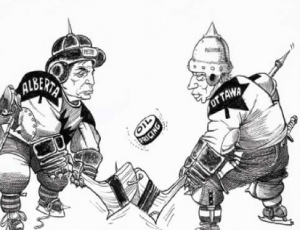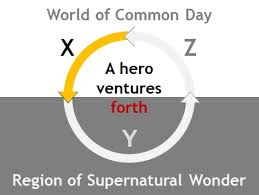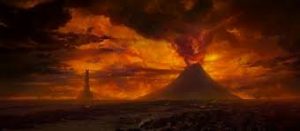The discipleship and love we see between Paul and Luke is fostered and developed through visitations in prison, risking death and worse to get some visiting time with Paul. Comparably, we also see how similar gradual progress is made with Mauritius’ eventual turn towards The Way, and how this change came in light of the suffering of one he loves. In today’s world, it is also necessary for us to have this patience and honest truth-seeking that is shown by Paul, Luke, and Mauritius throughout the film. Paul, Apostle of Christ shows us what it means for love to be the only way, and our lives in turn must see this become our action as well.
Paul of course must know that these risks are of course not in the best interest of Paul’s safety, but both parties know that getting Paul’s knowledge of The Way recorded would in the end be best for Christianity as we know it today. It’s a certain type of altruistic love that Paul practices for both The Way and Paul; going out of your way to help others, regardless of risk towards yourself. This altruistic love and trust of The Way, of course, is admirable even thousands of years later.
The words of wisdom by Paul throughout the film all make a commentary on his life in Christ and his certainty for his own faith. Paul makes it clear that no matter what he does, be it live, die, go left, or go right, he does it for or is guided by Christ. Therefore, the definition of living for Christ is defined by Paul quite well; living in Christ means, as he says, being certain of the place you go after you are done with this life. Additionally, Paul remains certain in whom he has faith in the full knowledge that his past is riddled with the persecution of Christians. Throughout the film, we see evidence of Paul’s contrition for those followers of Christ whom he has sent to heaven in front of him. We also see that fittingly for his character, Paul has a sense of contentment with being imprisoned and persecuted, as he knows per his past life, that he undoubtedly has earned much worse.
Luke had the thought to risk his life not only for spreading The Way but to visit his friend. Luke going through the trouble of sneaking in and out of Mamertine prison in the middle of Rome displays the unapologetic and altruistic relationship between Luke and Paul, especially considering how vastly anti-Christian all of the Roman Empire would have been at the time. Luke, as an avid follower of The Way, values the truth and honesty in Christ. Furthermore, he doesn’t lie to his fellow Christians on their way into Nero’s circus. We all should know that our life on Earth ends often with pain and suffering, but it is with certainty in your faith such as Paul has, that we can be reassured that beyond this life is something greater waiting for us. Luckily for Luke, though, he is saved in the nick of time by the man one expected to start making a turnaround into The Way. This, of course, was Mauritius who called to have his daughter healed by someone he knew was qualified to do so.
Before this aforementioned point in the film, Mauritius is a Prefect of Mamertine prison, where Paul is imprisoned. During the film, however, we see the seeds of doubt sown in Mauritius’ mind; we see that he gradually begins to doubt more and more the alleged power of the Roman gods. First, with the discovery of Luke and Paul’s deeds to scribe the stories of Paul and his discipleship under Christ Himself. Of course, Mauritius began this investigation into Paul and Luke with hopes to find plots of terrorist conspiracy, but instead found only aforementioned writings about Paul and his journeys with his faith.
Similar to how we have previously had discussion upon reasons to believe, so too are a few more good reasons for faith revealed upon some analysis of the film. For example, a reason to believe in Christ & the afterlife is that being able to take certainty in something beyond ourselves can be a source of self-security and reassurance, even in the most troubling times. In the film, we see how Paul takes certainty in his faith in Christ and has ultimate faith that at the end of his life, no matter how bitter it may be, what comes next will be better. Luke also spreads this message of faith in an afterlife to his peers in their time of imminent, certain death and the hands of Nero’s circus. Furthermore, the choice to turn to Christ and have trust in The Way is one made by Mauritius when he becomes fed up with inaction from the Roman gods he believes in
This is comparable to Mauritius’ newfound faith to call in Luke, a man of The Way, and physician, to heal his gravely ill daughter. Mauritius, out of love for his daughter, begins to show how his trust in The Way and Luke begins to out-way his trust in the Roman gods and his wife’s ideology. This further affirms that the unconditional love that Christianity centrally revolves around is superior to the wishy-washy temperments of Roman faith figures.
Christianity today should not be taught as an ideologically static, ‘do this do that, or else you’ll go to hell’ topic, but as one that invites its
bible itself, its messages, motives and themes change noticeably from the old testament to new, and so too should contemporary attitudes around religion shift with the passing of time and developing minds of the general public. Christian altruistic love such as Paul has is not something we can be told or taught, but it just what is discovered to be the truth, and discerned by our own honest seeking that the central logic and basic law of Christianity
is love and love alone love is Altruism Luke is a good teacher he honestly tells his peers the truth and allows them to way. It is the choice of the student to follow along or just be like Nah bruh.
In fact, in the context of Christianity, this ability to discern the truth for ourselves is considered virtuous, as it grows from wisdom, knowledge, and reverence of and for that which is holy.
Paul’s, Luke’s, Mauritius,’ choices were to have love and trust in The Way, and so too must our own. Through the previously wretched life of Paul, and his eventual turn to the way, it becomes plain that love truly is the only way, especially when it comes to developing one’s self to become better and more certain in faith. Christianity today would know nothing about Saint Paul if not for the love and courage of Luke.




